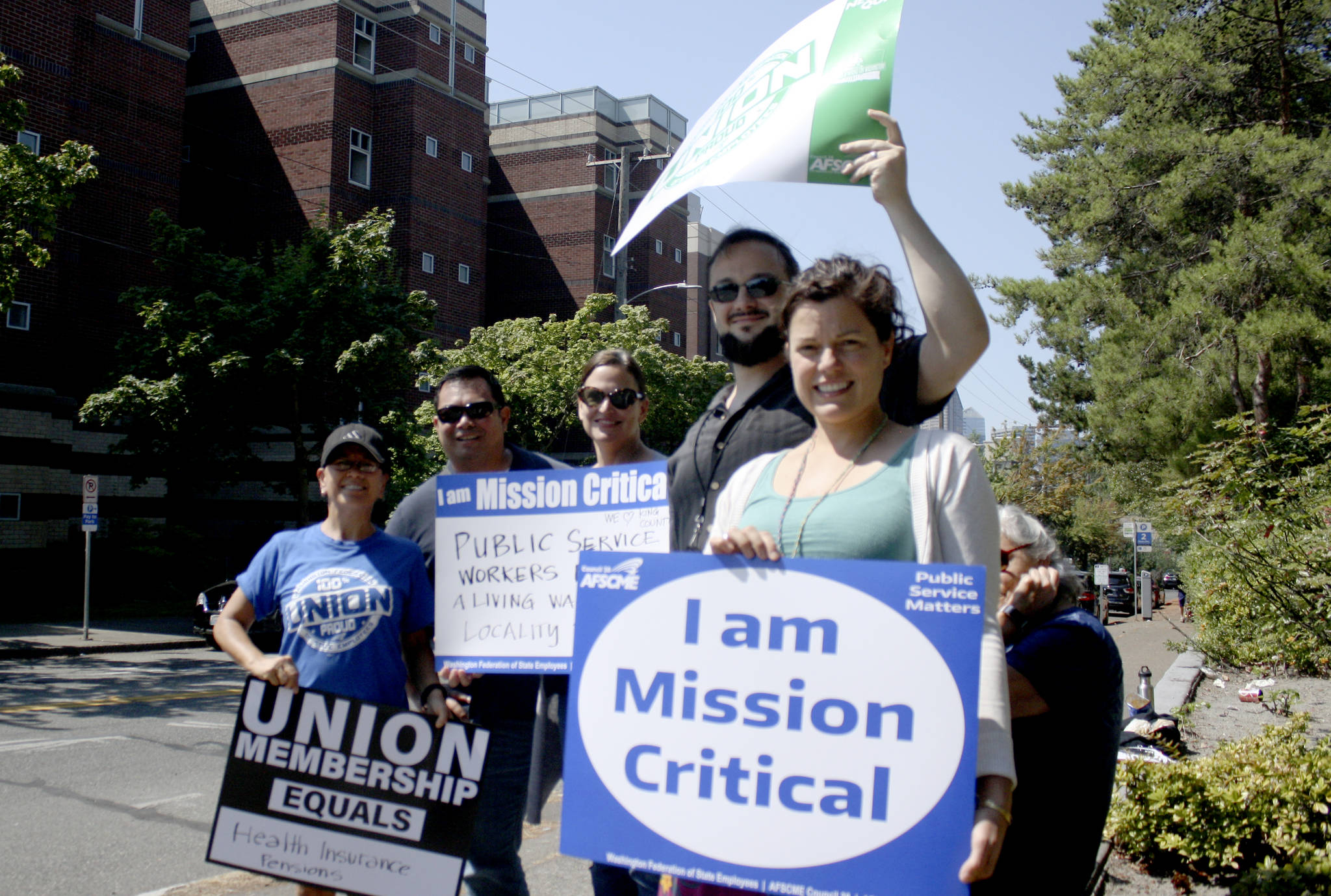As a case manager at the state-run Developmental Disabilities Administration (DDA), Kym Adams has connected Seattleites with intellectual disabilities to employment and housing services for more than a decade. Adams finds her work fulfilling and rewarding. “It’s humbling,”Adams said as she stood outside of DDA’s white building on Thursday. “I watch people with severe disabilities … overcome obstacles every day.”
But Adams and her co-workers’ wages haven’t kept pace with Seattle’s rising cost of living, making it increasingly difficult to survive, the 54-year-old said. High employee-turnover rates have increased her workload, causing her to spend a few hours a week mentoring new co-workers who often leave DDA for higher-paying jobs elsewhere in the region within six months. Once a lively workplace with a tightknit community, the center has transformed into a quiet space where Adams recognizes only a few of her most devoted co-workers. “We love working with people, so we’d rather continue working for the state,” she explained.
On Aug. 9, Adams and a few of her co-workers traded their lunches for picket signs to demand higher pay and affordable health care in their ongoing contract negotiations with the state. The DDA workers joined more than 20 “unity breaks,” staged by members of the Washington Federation of State Employees (WFSE) union, scattered throughout the city. Adams and her co-workers are asking the state for the first county locality-based pay for WFSE members to ensure parity wages with King County’s cost of living.
This summer, about 60 percent of the more than 40,000 state government employees in King County are in contract negotiations with the state, most of whom desire cost-of-living raises and more affordable healthcare, said WFSE executive director Greg Devereux. “We have over 140 different unity breaks around the state—folks are really trying to make sure the governor is aware of how critical these issues are to state workers,” Devereux told Seattle Weekly.
Adams’ co-worker Kara Ireland, 50, underscores the necessity of the issue by noting that many of her colleagues have left DDA to work as case managers for King County’s Department of Community and Human Services. According to WFSE, the state employee-turnover rate across sectors has hovered around 10 percent since 2015, leading management to constantly train new workers. The 2017 turnover rate at DDA was 19 percent, according to Washington State Department of Social and Health Services spokesperson Mindy Chambers. Adams cited the low employee retention for a loss of institutional knowledge in the agency. “Everytime that there’s turnover with a case manager, there’s less information about the client’s health or behavioral needs,” she said. Case managers often depart before families are informed of all the services available to them.
Other former DDA staffers have moved to less-expensive cities such as Bellingham, where they can afford to buy a house. Case resource managers employed by the state earn $23.95 to $32.30 an hour, while a similar job opening at the county’s Department of Community and Human Services listed an hourly salary of $29.78 to $37.75. A recent Crosscut report showed that case managers at city-funded nonprofits fare even worse: Entry-level employees at Seattle’s Downtown Emergency Service Center make $15.45 to $16.45 an hour, according to the report.
Meanwhile, King County’s weekly median income in the last quarter of 2017 totaled $1,583, according to the Bureau of Labor Statistics data. Although DDA employees negotiated a 16 percent raise over two years in their 2016 contract, Adams said it still wasn’t enough. “Everybody works so hard here. We have large caseloads, and to even pay rent or to buy a house in Seattle is impossible, so we have people commuting,” Ireland said. “I can’t tell you how many times I’ve had the conversation with my husband, ‘Are you sure we can’t move?’ ” Another case manager chimed in to say that wages are so abysmal that single parents in their office qualify for Medicaid.
Ireland noted that the case managers nearing retirement are sometimes forced to live with several roommates or work odd jobs to make ends meet. Ride-share decal stickers plastered on her co-workers’ cars indicate to Adams that they supplement their income by driving on the side. Yet Adams considers herself “one of the lucky ones” because she lives in a dual-income household and her Interbay landlords have not significantly increased the rent in recent years. But others aren’t as fortunate. Adams surmises that about a fifth of her 100-plus co-workers are two paychecks away from being homeless.
In addition to asking for fairer wages, the workers hope to return to the 12 percent out-of-pocket health-care costs negotiated during their previous contract, compared to their current 15 percent. “When we started, our health-care benefits were great. That was one of the pros of … being paid a little less,” said Ireland. “We don’t have great health benefits anymore.”
State-employed case managers aren’t the only ones struggling to make ends meet. Washington’s Office of Financial Management 2018 salary survey revealed that 87 percent of state employees make less than estimated market rates. The building pressure led about 150 state employees to discuss low wages and high housing costs with local legislators at an Aug. 2 forum at South Seattle Community College. During the forum, Adams recalled a peer Department of Social and Health Services worker cry as she told the group that she sells her plasma twice a month to feed her children. “That broke my heart,” Adams said.
It remains to be seen whether the U.S. Supreme Court’s recent Janus vs. AFSCME decision, which exempted public-sector employees from paying dues to unions that collectively bargain on their behalf, will impact the current contract negotiations. For now, DDA workers plan to lobby in Olympia in February to demand higher wages. Tentative agreements are due to the Office of Financial Management on Oct. 1, according to the Washington State Department of Social and Health Services—the department that oversees DDA.
“I just want people to keep a roof over their heads,” Adams said.
mhellmann@seattleweekly.com
Update: The story was amended on August 13 to include DDA’s 2017 turnover rate.








